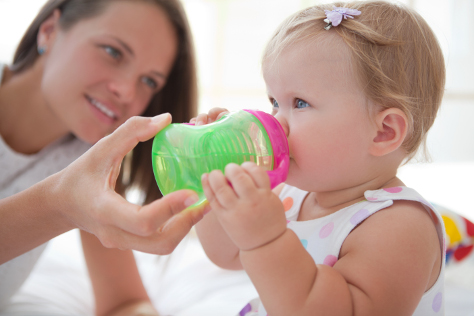Babies drinking water: What you need to know
Understanding why babies shouldn't drink water under 6 months old

It is advised that you shouldn’t give your baby water before they are six months old. Before then, they get all the nutrients they need from breast milk and do not need extra fluids, even in hot weather.
After 6 months, and when you begin weaning your baby onto solids, your baby may have less of an appetite for milk so you can introduce little amounts of water into their diet. Find out more about what drinks to offer your baby and when.
Why shouldn’t I give my baby water before six months?
Giving water to babies younger than six months puts them at risk of infection. It may also cause your baby to drink less breast milk and miss out on the nutrition they need. In some severe cases, when a large amount of water is consumed, a condition known as water intoxication can occur. This is when sodium in the baby’s bloodstream becomes diluted, causing tissues to swell and leading to dangerous interference with brain activity.
Symptoms of water intoxication
Early symptoms of water intoxication can include irritability and drowsiness. Other symptoms include facial swelling or puffiness, a low temperature and seizures (above 37.5⁰C). If you suspect your baby to have water intoxication you should seek medical attention immediately, either by calling an ambulance or taking them to A&E.
How can I keep my baby hydrated without giving them water?
Breast milk is actually 80% water so whenever you feel your baby may be thirsty you can feed them and be sure they are getting all the hydration and nutrients they need.
It can be difficult to know how much milk your baby is getting so judge whether you think your baby is getting enough milk by the number of wet nappies. If you’re worried your baby isn’t getting enough milk speak to your GP as soon as possible.